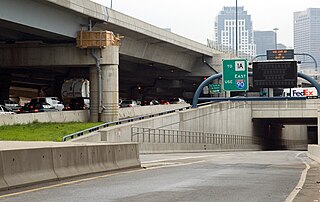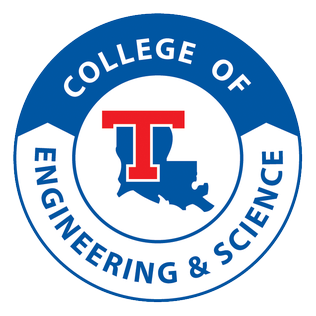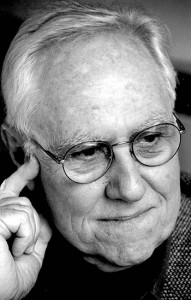Related Research Articles

The Big Dig was a megaproject in Boston that rerouted the then elevated Central Artery of Interstate 93 that cut across Boston into the O'Neill Tunnel and built the Ted Williams Tunnel to extend Interstate 90 to Logan International Airport. Those two projects were the origin of the official name, the Central Artery/Tunnel Project. Additionally, the project constructed the Zakim Bunker Hill Bridge over the Charles River, created the Rose Kennedy Greenway in the space vacated by the previous I-93 elevated roadway, and funded more than a dozen projects to improve the region's public transportation system. Planning for the project began in 1982; the construction work was carried out between 1991 and 2006; and the project concluded on December 31, 2007. The project's general contractor was Bechtel and Parsons Brinckerhoff was the engineer, who worked as a consortium, both overseen by the Massachusetts Highway Department.

The Leonard P. ZakimBunker Hill Memorial Bridge is a cable-stayed bridge completed in 2003 across the Charles River in Boston, Massachusetts. It is a replacement for the Charlestown High Bridge, an older truss bridge constructed in the 1950s.

William Barclay Parsons was an American civil engineer. He founded Parsons Brinckerhoff, one of the largest American civil engineering firms.

A civil engineer is a person who practices civil engineering – the application of planning, designing, constructing, maintaining, and operating infrastructure while protecting the public and environmental health, as well as improving existing infrastructure that may have been neglected.

The American Society of Civil Engineers (ASCE) is a tax-exempt professional body founded in 1852 to represent members of the civil engineering profession worldwide. Headquartered in Reston, Virginia, it is the oldest national engineering society in the United States. Its constitution was based on the older Boston Society of Civil Engineers from 1848.

The Fu Foundation School of Engineering and Applied Science is the engineering and applied science school of Columbia University, a private research university in New York City. It was founded as the School of Mines in 1863 and then the School of Mines, Engineering and Chemistry before becoming the School of Engineering and Applied Science. On October 1, 1997, the school was renamed in honor of Chinese businessman Z.Y. Fu, who had donated $26 million to the school.

WSP USA, formerly Parsons Brinckerhoff, is an American multinational engineering and design firm. The firm operates in the fields of strategic consulting, planning, engineering, construction management, energy, infrastructure and community planning. It is a subsidiary of WSP Global.

The Big Dig ceiling collapse occurred on July 10, 2006, when a concrete ceiling panel and debris weighing 26 short tons and measuring 20 by 40 feet fell in Boston's Fort Point Channel Tunnel. The panel fell on a car traveling on the two-lane ramp connecting northbound I-93 to eastbound I-90 in South Boston, killing a passenger and injuring the driver. Investigation and repair of the collapse caused a section of the Big Dig project to be closed for almost a full year, causing chronic traffic backups.
John Cogliano is a former Massachusetts Secretary of Transportation and Chairman of the Massachusetts Turnpike Authority. He was appointed to the position by Governor Mitt Romney in May 2005. In 2007 Governor Deval Patrick replaced Cogliano with Bernard Cohen.
James Kip Finch was an American engineer and educator.

William J. Wilgus (1865–1949) was an American civil engineer. In 1902 he was responsible for the design and construction of New York City's Grand Central Terminal. Wilgus coined the term "taking wealth from the air" from his idea to lease the area above the Park Avenue Tunnel in order to help finance the station. This is based on the legal concept known as air rights. He is also credited with the double-stacked track design of the station, that greatly increased its capacity. During the First World War, Wilgus served as the American Expeditionary Force chief of logistics and rail transport.

Adefemi Kila is a Nigerian politician and engineer who served in the Senate, representing Ekiti Central in April 2007 just after working for Julius Berger Nigerian Plc for 30 years as a civil engineer and as a technical manager (administration) for 18 years. He is currently a council member of Standards Organisation of Nigeria SON. He is a devoted Christian of the Anglican church of Nigeria.
Michels Corporation is a family-owned and operated energy and infrastructure construction company headquartered in Brownsville, WI. Established in 1959, Michels Corporation ranks #27th out of 400 top contractors in North America, performing work throughout the world.
Man-Chung Tang Ph.D., P.E., Dist.M.ASCE, NAE, CorrFRSE is a Chinese-born American civil engineer and businessman. Tang is chairman of the board and the technical director of T. Y. Lin International, an American design and construction company.

The College of Engineering and Science (COES) is one of five colleges at Louisiana Tech University, a public research university in Ruston, Louisiana. The roots of the college date back to the founding of Louisiana Tech in 1894 when the Department of Mechanics was created. Today, the college includes twenty-five degree-granting programs: fourteen undergraduate, seven master's, and four doctoral programs. College programs are located on the Louisiana Tech campus in Ruston, Louisiana. In addition, courses are offered at the CenturyLink Headquarters in Monroe, Louisiana, at Barksdale Air Force Base, in Bossier City, Louisiana, and at the Louisiana Tech Shreveport Center in Shreveport, Louisiana.

Samuel Charles Florman was an American civil engineer, general contractor and author. He is best known for his writings and speeches about engineering, technology and the general culture. The most widely distributed of his seven books is The Existential Pleasures of Engineering, published in 1976, second edition in 1994. According to one authority, "It has become an often-referred-to modern classic." His last published book was Good Guys, Wiseguys and Putting Up Buildings: A Life in Construction, published in 2012.

James Laurie was a prominent American engineer and one of the founders of American Society of Civil Engineers (ASCE). He performed surveying, bridge design, and route design for a number of railroads in New England.
Andrew John Whittle is Edmund K. Turner Professor of Civil and Environmental Engineering and former Head of the Department of Civil & Environmental Engineering at the Massachusetts Institute of Technology. He specializes in Geotechnical Engineering and more particularly in numerical and constitutive modelling.
Rachel Susan Skinner is a British civil engineer with Canadian-based consultant WSP Global. She was named one of the Daily Telegraph Top 50 Influential Women in Engineering in 2016 and both the Best Woman Civil Engineer and the Most Distinguished Winner at the European Women in Construction and Engineering Awards in 2017. Skinner became the youngest president of the Institution of Civil Engineers in 2020. In 2019, she was elected a Fellow of the Royal Academy of Engineering (FREng). She was appointed CBE for services to infrastructure in the 2022 New Year Honours.
Robert Ifedayo Akintunde is a Nigerian engineer, a distinguished Fellow of the Nigerian Society of Engineers (NSE), and former President of the society. He was the first African to win the WFEO Medal of Engineering Excellence after doing so in 2017. Akintunde is also a Fellow of the Nigerian Academy of Engineering, the Institution of Civil Engineers (UK), and a Chartered Engineer of the U.K. since 1965. He was registered by Council for the Regulation of Engineering in Nigeria in 1974.
References
- ↑ "Columbia News".
- ↑ Saxon, Wolfgang (9 June 2001). "Henry Michel, 76, Civil Engineer and Leader in Building Industry". The New York Times.
- ↑ "American Society of Civil Engineers (ASCE)". Archived from the original on 2010-04-01. Retrieved 2010-03-27.
- ↑ "Former CEO of "Big Dig" Contractor to Address Smith Students".
- ↑ "Mr. Henry L. Michel". www.nae.edu. Archived from the original on 2010-05-30.
- ↑ "American Society of Civil Engineers (ASCE)". Archived from the original on 2010-04-01. Retrieved 2010-03-27.